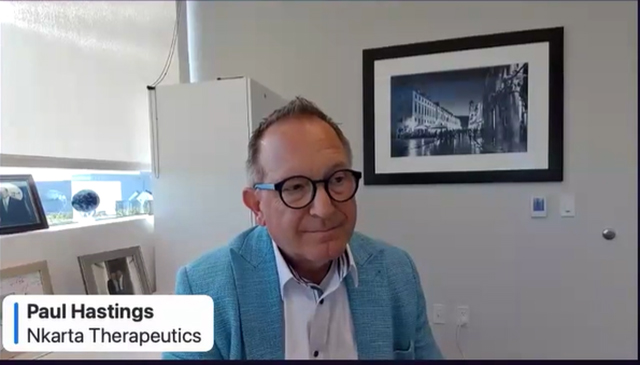Speaking on a recent Endpoints News panel, Nkarta CEO Paul Hastings discussed the impact of regulatory uncertainty and federal funding cuts on the investment climate for biotechnology and the ability to launch new companies and deliver transformative medications to patients.
Hastings, the previous chair of the Board of the Biotechnology Innovation Organizaiton (BIO), described what happens to companies pioneering next-generation medicines, like cell and gene therapies, when changes in Washington lead to uncertainty.
“Do you know the saying that ‘nature abhors a vacuum’?” Hastings asked. “In our business, investors abhor vacuums. They don’t like uncertainty. They don’t like not knowing where things are going. Uncertainty tends to breed volatility, and volatility tends to breed selloffs in the marketplace.”
A five-time biotech CEO, Hastings currently leads a cell therapy company in the Bay area working to harness the body’s natural killer cells to treat autoimmune diseases like lupus. He said that the current regulatory uncertainty is putting financial pressure on cell and gene therapy developers to make difficult decisions on staffing to ensure they have enough of a cash runway to meet their clinical milestones.
Hastings also weighed in on the impact of NIH cuts and funding freezes at American universities, warning they could mean fewer biomedical graduate students and reduced support staff, adding stress to an already resource-constrained environment. Nkarta is currently supporting investigator-sponsored trials (IST) for its NK cell therapy candidate at two major academic medical centers.
“If our research institutions lose NIH funding, there will be fewer discoveries and fewer opportunities to run ISTs because of lack of infrastructure,” he said.
Hastings noted that Nkarta, like many biotech companies, wouldn’t exist without robust NIH funding to seed early research, which gives biotech entrepreneurs the scientific foundation and confidence to launch new companies.
“I was just talking with our chief medical officer, who was in the lab of our founder, Dario Campana, when so much of the original work on NK cells was done under NIH grants.” Hastings said. “For every dollar Dario spent using money from NIH grants, Nkarta has spent $65 to develop our cell therapy. Thanks to NIH grants and our founder’s work at Saint Jude, here we are all these years later with a chance to deliver a transformative treatment for patients with lupus and other autoimmune diseases.”
Hastings said that even though morale is low and uncertainty high right now in the sector, it’s more important than ever for biotech leaders to make their voices heard.
“I’ve been doing this for 45 years. I’ve seen cycles. This one is very unusual. I tell people, ‘Don’t give up, because things will change. And the industry will morph.’ It’s going to take us speaking with our individual members of Congress. A lot of folks are saying, ‘Congress doesn’t matter now.’ I don’t buy that. I think Congress does matter. There are three branches, and we need to hold them accountable. We need to help them do their jobs and engage both sides of the aisle. We need to have those meetings on the Hill so we can explain what we do. We’re not the enemy. We’re all here together doing innovation. We’re all part of the ecosystem. And when you hurt one part of the ecosystem, you hurt the whole ecosystem. So, let’s all be part of the solution to help fix the system.”




